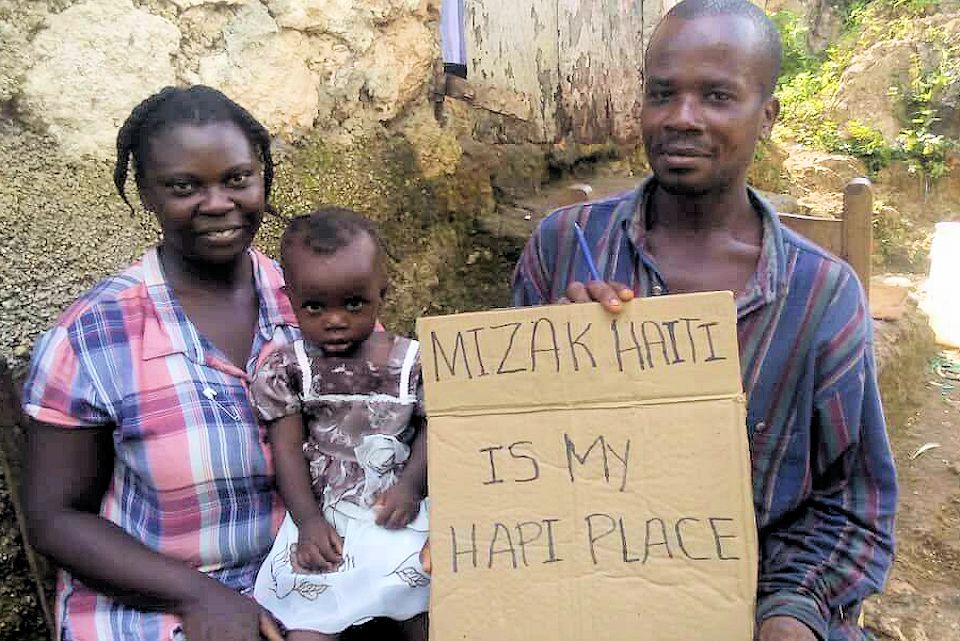Haitian Assets for Peace International, HAPI, is located in Mizak. As Internally Displaced Persons flee to Mizak, it is feeling the strain of becoming a resettlement community.
VALERIE MOSSMAN-CELESTIN
Executive Director, Haitian Assets for Peace International
Resettlement. Immigration. These words project prominently in our news cycle alongside images of suffering humanity. Some migrants seek asylum from political or religious persecution while others hope for a ‘better life’ of opportunity. The United Nations Human Development Report estimates that 1.3 billion people in 107 countries live in “multidimensional poverty” – indices that look, wholistically, at a person’s ability to meet basic needs. What is the compassionate response?
U. S. border towns are not alone in feeling the impact of Haiti’s political instability and natural disasters. Mizak, Haiti is a resettlement community as “Internally Displaced Persons (IDP)”—particularly young people–flee dangerous urban gang activity.
Haitian gangs kill, steal, and destroy. They enter churches to murder and kidnap. They brazenly boast their deeds on media outlets. They believe they are invincible because of the military-grade weapons they tote. They loot under the façade of being modern-day “Robinhoods” for the poor, demanding healthcare, jobs, and education. What do they deliver? Gangs paralyze the movement of goods and people and cause businesses and organizations to shutter. Their actions are driving unemployment and inflation rates higher and resources rarer.
Internal migrants seek “rural sanctuaries” and increase demand on local food supply, housing, healthcare, and education. Some also introduce new concerns—such as testing HIV-positive.
The 15,000 Haitians we saw under the bridge at Del Rio, TX were the visible “tip of the iceberg.” What is hidden are the 1.3 billion living in multidimensional poverty around the world. At HAPI, we are tackling the “hidden iceberg.”
HAPI is an economic engine in the community o Mizak providing jobs, education/training, and saving lives. In Haiti, our staff is 100% Haitian. We are a trusted organization, both in the U.S. and Haiti. HAPI is an Advance of The United Methodist Church and an EngageMI Ministry Partner with The Michigan Conference.
But our services at both Felisane Health Center and HAPITech are feeling the strain as persons flee population centers and resettle in rural communities like Mizak. Patient visits are climbing. Expectant women and malnourished persons have increased. More stroke victims. HAPITech is expanding course offerings to include window installation in response to community-led surveys pleading for more skilled training that can lead to jobs. Daily, the staff fields community requests for 24/7 healthcare, business education, and more.
Mizak is a peaceful, mountain community with no public utilities, university, or formal economy jobs. Persons live mostly as they have for years: men breaking ground for gardens, barefoot children toting gallon jugs or hauling water on the backs of donkeys, large families spilling out of colorful, rock and cement wall houses with rusted tin roofs, and women hunched over outdoor charcoal grills or bright basins of laundry. Free-range chickens roam the yard and goats graze on nearby greenery against the backdrop of mountains caressed by Caribbean breezes.
Sound idyllic? That is one lens. Zoom in and notice the hunger, illiteracy, suffering, and death from preventable disease or childbirth–and the lack of cash income for basic necessities. The roof that leaks with every storm. The young person hanging on the porch who wistfully dreams of a different future.
This is the growing community that HAPI serves. At HAPI, we believe that a just response preserves dignity, cares for health, safety, and basic needs—such as gender-equitable access to healthcare, education or training, and fair wage jobs. We deliver.
We ‘deliver’ because of faithful mission partners who have covered us with prayer and financial gifts. For 2022, we are asking congregations to enter into a covenant relationship with pledged support. We must act NOW to guarantee our commitment to our sisters and brothers in Mizak Haiti for 2022.
Thank you again for standing with HAPI to ‘welcome the stranger’ and tackle the ‘hidden iceberg’ in Mizak, Haiti.
Last Updated on October 5, 2021

